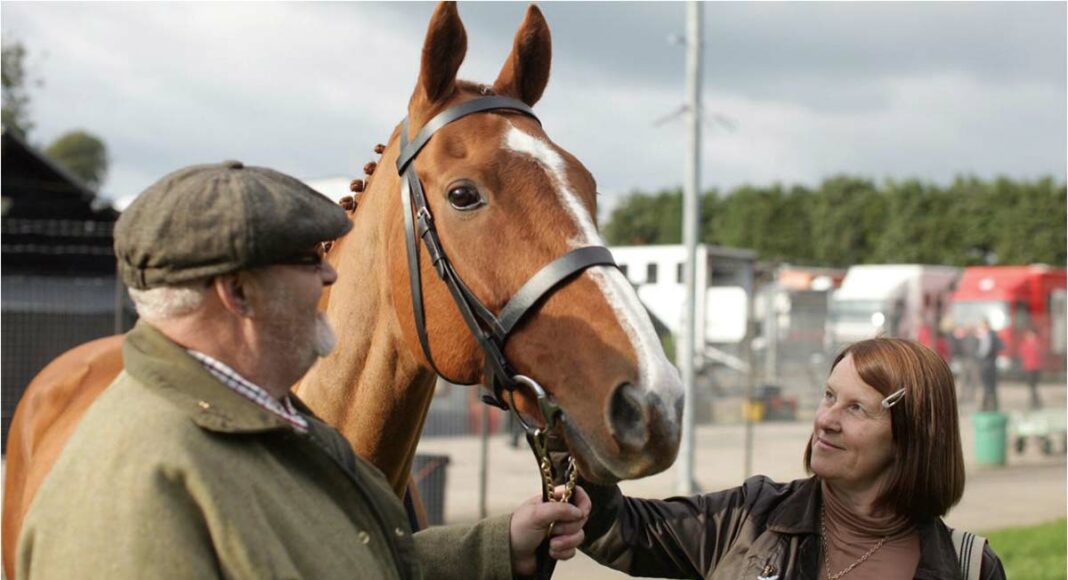Who says fairy tales are just for princesses? If you want magic, see Dark Horse, an accomplished, crowd-pleasing documentary about the working-class denizens of a tiny Welsh mining community that chips in to breed a racehorse to compete against thoroughbreds in the Sport of Kings. But, more than magic, this story is about hard work, high spirits, determination, and sheer chutzpah—on the part of the villagers, and especially the unorthodox horse they raise into a champion.
Yes, it’s a Cinderella story about a plucky pony that could. But documentary filmmaker Louise Osmond has directed taut films about yacht racing (Deep Water), and mountain-climbing (The Beckoning Silence), and keeps us on edge. We never know what the outcome of each race will be, nor are we prepared for the many unexpected bumps along the road.
The tale begins in 2000, in a mining village in Wales. After the mining pits close down, and the locals are in transition, a barmaid named Jan Vokes gets a wild idea. One night, one of her customers, Howard Davies, a tax accountant, is regaling the house with the story of the time he helped a client set up a horse-racing syndicate. Right there, Jan decides she’s going to breed a racehorse.
Well, why not? Her father, we learn, bred “show budgies” (parakeets) when she was a child, and she won some prizes as a teen raising greyhounds. So Jan, a delightful storyteller with a twinkle in her eye, decides to move into the racehorse field by starting her own “syndicate” of villagers and pub regulars. Anyone interested in joining in for 10 pounds a week is instructed to “see Jan at the bar.”
Some 30 locals sign on, and their initial investment goes toward the purchase of a brood mare. They get a deal (310 pounds) on the one they pick; she had never won a race and was considered so “mental” that no jockey would ride her. Stud fees are pricier, but Jan and Howard maneuver to purchase the services of a stallion marked down to 3,000 pounds.
Soon enough, the mare is pregnant; we see her birth the foal in a charming black-and-white home movie sequence. He’s a tall, gawky creature with white socks on his spindly legs that Jan and her husband, Brian, keep in a ramshackle shed next to the chickens in their yard. When the syndicate gathers at the pub over their pints to name the animal, they all acknowledge that he’s “Jan’s dream,” and in a moment of solidarity among the co-owners, they name their horse “Dream Alliance.”
Dream is packed off to board with a professional trainer (Jan likens it to sending a child off to boarding school), to see if he has any skill or inclination for racing. But, after a respectable showing in his first few outings, he wins his fourth meet, and—against all odds—his professional career is underway. (“Slumnag millionaire,” screams one racing-form headline.)
“Part of the attraction,” recalls Howard, “is, it couldn’t be done,” certainly not on their terms. And yet, Dream continues to run—and win—in ever more prestigious races, defying the oddsmakers, shocking the “landed gentry,” for whom horseracing has always been an exclusive club, and winning the hearts of the public for this “working-class horse” with the undistinguished pedigree. Of the traditional racing elite—men in three-piece suits, ladies in extreme hats—Jan smiles devilishly. “Those sorts of people like to keep us commoners out, I think.”
There are plenty of dark moments in Dream’s career, rendered with nail-biting suspense by filmmaker Osmond—particularly as the races get bigger and the courses more dangerous. But the movie never loses its humor, or its heart. (When Dream goes through a slump, Jan shrugs it off. “He was a Welsh boy … quirky.”)
Win or lose, we get a strong sense of the unbridled affection Jan, Brian, Howard, and all the villagers feel for Dream himself—fueling the choices they make on his behalf. In a milieu where horses are “an industry,” the locals consider Dream “one of the family,” making Dark Horse much more of a love story than a sports doc.
DARK HORSE
*** (out of four)
Written and directed by Louise Osmond. A Sony Classics release. Rated PG. 85 minutes.














The movie was great, we were wondering if Dream Alliance is still living.